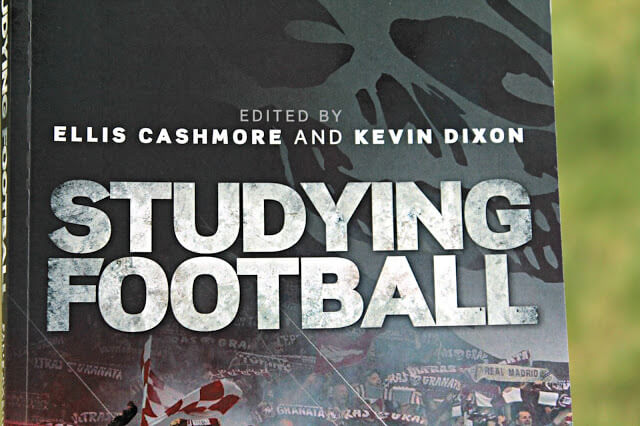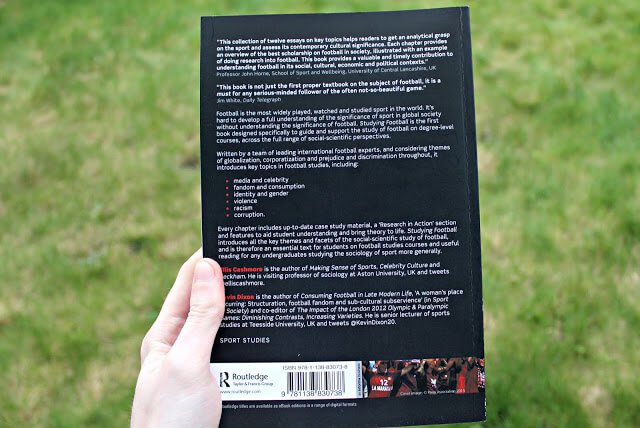Despite her best efforts, my partner's head wilts slightly as she tries to muster enthusiasm whilst I spill delirious tales of Mario Balotelli's off-the-field antics from my mouth or energetically enthuse of the immense charm (and sartorial elegance) of Jurgen Klopp . Occasionally, I entertain discussions on the fiscal management of Southampton or of the terrible actions of Adam Johnson. What I never discuss with my better half when we talk about football is football itself.
There are multiple reasons for this approach - not least, however, is the fact that, football is, when one thinks about it, inconsequential at best and rather daft at worst. Indeed, in the introduction to Ellis Cashmore and Kevin Dixon's book Studying Football , they make the same point (albeit in a much more eloquent manner than I). "Football's trick," they note "is to stop you stepping back" and noting the futility and absurdity of twenty two men kicking spherical leather ball around a trimmed field for an hour and a half. We're all so caught up in the myth of football, of the meaning we've invested in a simple game, that "no one notices how pointless and nonsensical it is."
Yet, this is not to say that football, and the issues which attach itself to the sport, are of no value to us from a sociological or historical perspective. Its not unreasonable to suggest that, were historians in the future to study the twentieth and twenty first century exclusively through looking at the back-pages of the tabloid press, they would still be able to piece together a pretty good impression of these times and the morals and values of the societies reporting on them. Our fascination with Gazza's World Cup tears, or the shared horror we experienced at Ronaldo's wink, or our damning of Suarez's bite(s), encapsulates a great deal of our national character.
That we can learn more from football than how to successfully apply wing-backs or a heavy pressing system for our Sunday league teams is a belief shared, and displayed, throughout Cashmore and Dixon's book. Split into twelve chapters - with titles such as "Violence", "Racism" and "Media and Celebrity" - Studying Football constitutes an enthralling compendium of works by a selection of writers (chosen by editors Cashmore and Dixon) tackling a wide and diverse array of issues in easily digestible and concise fashion. Football, it would seem, can teach us a great deal more than just football itself - why, for example, does the game inspire violence? What can the overwhelming presence of foreign footballers in the Premier League teach us about globalisation?
Thankfully, it is with pleasure that I can report that whilst the tome is thoroughly researched and written with academic rigor, Studying Football is an incredibly enjoyable and accessible book even for readers not used to such writing styles. For anyone who may suffer nightmares over academic writing (I nod my head in empathetic sympathy towards anyone who has attempted to unspool the dense texts of Deleuze or unravel cogent meaning from Zizek), the same worries need not apply here. This, like Cashmore's previous work (including the splendid Celebrity Culture), is a collection of detailed insights presented in a way which keeps us gripped and enlightened simultaneously. The clarity with which information is presented - broken down into subsections and featuring bullet-point highlights - makes for a pleasure to peruse.
Studying Football is a smart and clever collection which I would heartily recommend to all fans of the game. However, the strength of the book may stem from its ability to engage those who read it with issues much bigger than the game itself - its an anthology which has managed to make us actually "step back" and, in doing so, revealed that there's much more to football than we often look for. As such, this is a great primer for university students looking to interact with social sciences who may find other texts too dry or, equally, for anyone with an inquiring mind looking for new ways to interact with popular culture.
Pleasingly, too, Studying Football has armed me with a whole host of new topics to discuss with my other half the next time I try and convince her of the merits of soccer. If she won't be moved by Ranieri's tears, then perhaps we can still discuss the institutional corruption found within FIFA (as detailed within the text's 272 pages). Or maybe, just maybe, upon reading a few chapters of the book, she'll appreciate the endless fascination myself and the millions, if not billions, of football fans across the globe share towards the game.



No comments
Post a Comment